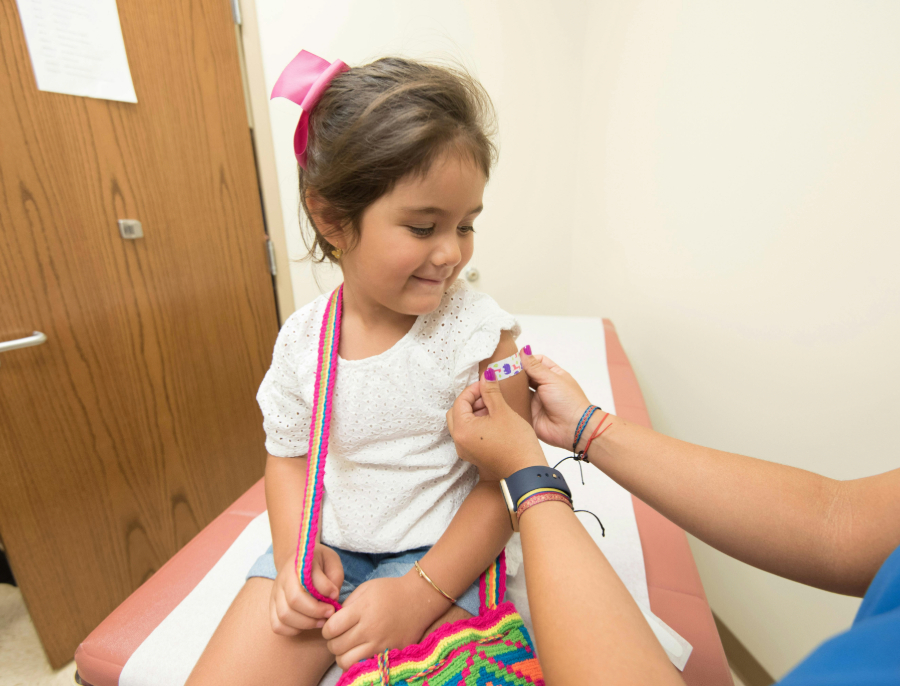We Need To Stop Debating the Efficacy of Vaccines

Every parents’ group chat has that moment—someone posts an article about vaccines, phones start buzzing, and before you know it, the debate is on. The Balanced Blonde host Jordan Younger gets it. She told listeners she had “never went near this topic with a 10-foot pole” because talking about shots “became such a polarizing topic” that people fear being “completely canceled.”
Even so, Younger said her show is “an open-minded space” that has “always had the tough conversations,” so she finally hit record with integrative pediatrician Dr. Joel “Gator” Warsh.
Younger’s goal is simple: let parents hear an actual pediatrician answer the questions they whisper at playdates. Warsh sees the hesitation every day. “People have questions. There is hesitancy around vaccines right now,” he says. “I’m not against vaccines at all.” He also made clear that his office administers vaccines, regardless of the debate around them.
Why does this topic still feel like walking a tightrope? “If you don’t say no one should ever get a vaccine, then they’re mad at you. If you don’t say that vaccines are the best thing ever and put them on a pedestal, then they’re upset with you,” Dr. Warsh says. To him, the extreme ends shout the loudest while most parents sit in the messy middle, looking for straight answers.
What the podcast actually covered
Warsh describes his office policy plainly, stating, “In my office, we give vaccines. I don’t force anybody to do anything.” Some parents follow the standard schedule, while others opt for a slower approach. Across those choices, one frustration persists—extremes on both sides drown out nuance.
Younger has watched friends face that tension in real time. When parents ask pediatricians about a delayed schedule, “they’re told, ‘You can’t be here,’” she says, calling the response “terrifying because we should be able to ask our doctors anything.” But both Younger and Warsh agree that respectful dialogue—not dismissal—builds trust.
Stop ignoring science
Dozens of large-scale studies have found no link between vaccines and autism, or any other neurodevelopmental diagnosis. The CDC’s ongoing meta-analyses show “no relationship between vaccines and autism spectrum disorder,” a conclusion echoed by the World Health Organization’s Global Advisory Committee on Vaccine Safety, and Johns Hopkins researchers who have reviewed decades of data. The 1998 Wakefield paper, which sparked the myth, was retracted. The author also lost his medical license, and every attempt to replicate his claims has failed.
So why the rise in autism diagnoses? Improved screening, broader diagnostic criteria, and society’s long-overdue rejection of neurodivergent kids. Blaming shots distracts from real research priorities—and, worse, endangers children too young or too fragile to be immunized.
Healthy questions versus harmful delay
Dr. Warsh is the first to admit that the vaccine schedule can feel intense, and that it’s okay to discuss spacing shots if your toddler has just battled a stomach bug. “Parents are worried they’re giving their healthy baby a medical product,” he says, and that worry deserves respect, not ridicule.
Skipping every shot because a TikTok post from a “mom-fluencer” said aluminum is scary isn’t okay, however. When local coverage dips below 95 percent, measles comes roaring back, endangering infants and immunocompromised neighbors who never signed up for that risk.
Younger pushes Dr. Warsh on community ethics, asking, “Wouldn’t you say if a child is vaccinated, the vaccinated child is protected?” He agreed but stressed that herd protection exists so “kids that can’t get vaccinated” stay safe too. Freedom to choose also carries a duty not to expose vulnerable people to preventable diseases.
A realistic path forward
Here’s a quick, drama-free roadmap for parents still weighing their options:
- Stick with evidence-based sources. CDC, WHO, and peer-reviewed journals post ongoing safety updates. They are dry reads, to be sure, but they’re not trying to make a commission by selling you “gut health” supplements.
- Bring every question to a pediatrician who listens to you. If your doctor refuses the conversation, it may be time to find one who won’t.
- Consider individualized pacing rather than outright refusal. A slower schedule can ease side-effect anxiety while still closing immunity gaps.
- Remember shared responsibility. Your decision protects—or endangers—people you’ll never meet but who rely on community coverage to stay healthy.
Bring the conversation back to facts, not fear
Vaccination isn’t flawless; no medical intervention is. Continuous safety monitoring and honest risk-benefit updates are non-negotiable. But pretending they’re optional can be considered reckless.
So let’s retire the faux “debate” over whether vaccines work or not. Save the energy for honest discussions—equitable access, transparent research, nuanced schedules for medically vulnerable kids, and continued surveillance to keep a proven public health miracle safe and trustworthy.




















Leave a Reply